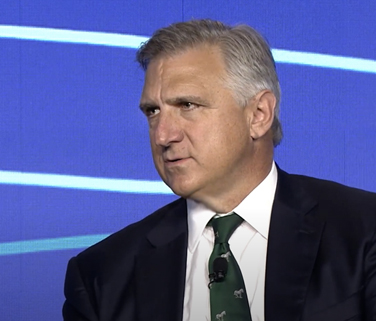On May 3, Amgen CEO Bob Bradway participated in a "fireside chat" with Bank of America biotechnology analyst Geoff Meacham at the World Medical Innovation Forum, organized by Mass General Brigham and Partners Healthcare. Bradway's session with Meacham was entitled, "Meeting the Moment: The Next Wave of Innovation in Cancer and Cardiology."
Bradway opened by declaring that we are living in "a golden moment for those who are interested in innovating and trying to solve problems that have long seemed intractable," such as cancer and cardiovascular disease, to say nothing of the novel coronavirus and COVID. "One day," he predicted, "we'll be able to look back and recognize what an incredible accomplishment it was to have so many different approaches to battling this pandemic emerge as quickly as they did."
The new wave of innovation is coming at just the right time, as the world's population continues to age and become more prone to aging-related diseases such as cancer, osteoporosis, and heart disease. The challenge posed by chronic disease has only increased over the past two and half years, as fear of COVID has deterred many people from seeking diagnosis and timely medical attention. Research suggests that "the earlier you start therapy to prevent the development of atherosclerotic disease, the better," Bradway observed, adding that currently available medicines can help prevent heart attack and stroke.
Turning to Amgen's approach to drug development, Bradway explained that the company starts with "a conviction that we understand the biology, that we have reason to believe that our approach to that biology will work in humans. We try to find diseases where the unmet medical need is high, where we think we can bring forward a big effect size. Then we proceed with the expensive clinical trials that are required to get approval and to try to meet the needs of patients." Amgen is investing heavily "in human genetics, and we've expanded that now to include other human data – proteomic data, transcriptomic data, and a variety of different sets of data – that we think we can use to better understand disease and how our medicines, prevent disease, and hopefully improve disease outcomes."
Bradway noted that Amgen entered the emerging field of bispecific T-cell engager or BiTE medicines through its acquisition of Micromet a decade ago. Since then, our company has launched one BiTE medicine targeting liquid tumors and is now working to achieve the same progress with investigational BiTEs aimed at prostate and small-cell lung cancers.
Asked about Amgen's potential interest in cell therapy, Bradway expressed optimism about long-term prospects for the field, while noting that BiTEs offer an attractive near-term option in view of their relatively lower cost of R&D and their shorter development timelines. Nevertheless, he said, "we continue to invest in [the cell therapy] space, primarily in early-stage technologies and through our venture investing arm…. We will continue to watch closely and see, as the data emerge whether the time is right to bring these on in a more comprehensive way than we have thus far."
Bradway cited Amgen's success in developing a new treatment for lung cancers that express the KRAS G12C mutation as an example of how improved molecular-level understanding of cancer can ultimately benefit patients. Although some 80% of diagnosed lung cancer patients are being screened for this mutation, fewer than half of patients advancing to second-line treatment have their KRAS status included in their electronic medical information. "The innovation is there," Bradway declared, "and shame on us if we allow the failure … to alert the physician that the appropriate mutation is present and that, therefore, an inhibitor of that mutation is an appropriate next step" for treating the patient.
Asked, finally, about Amgen's interest in looking outside the company for interesting candidate medicines, Bradway noted that the company's innovation has historically come in roughly equal parts from Amgen's own laboratories and from external partners. "It's a healthy balance of the two," he commented. "Our focus is to try to identify technologies where we think we have some skill that will be additive to what our partner has."



